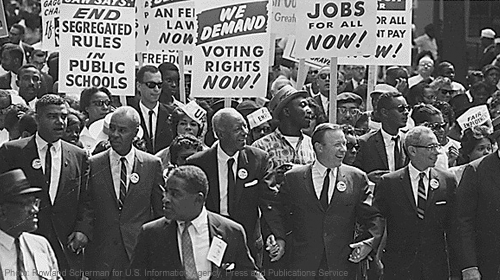
For me, few anniversaries inspire as much ambivalence as the 50th anniversary of the March on Washington. Billed as the "March for Jobs and Freedom," the event stands as both a shining example of the promise of the civil rights era and a reminder of how we as a nation have, in many ways, betrayed the ideals and vision expressed by the scores of speakers and musicians who addressed the crowd of a quarter of a million people on August 28, 1963.
The Rev. Dr. Martin Luther King, Jr.'s prediction that the March would go down "as the greatest demonstration for freedom in the history of our nation" has stood the test of time. Films of this gathering of people of different races and religions to demand that the nation address its history of discrimination and oppression remain moving today. The words of speakers like John Lewis and, of course, Martin Luther King, still speak to us today. And it is certainly true that the march ushered in a period of changes that would have been unimaginable just a few years before. The actions of courageous demonstrators and the passage of federal legislation outlawing discrimination in voting, housing, employment and public accommodations in the wake of the March helped transform the nation and bring us closer to realizing the ideals which we had often expressed but never truly followed.
And there is much to celebrate this week. We have come a long way from King's 1963 dissatisfaction with the inability of Black people to vote in Mississippi and the belief of Black people in New York that there was nothing to vote for, to the fact that Black voters across the country could join with others to elect a black president in 2008. And numerous commentators have credited the passage of the mid-1960s civil rights laws and affirmative action with helping to create a Black middle class for the first time.
But the March's emphasis on jobs and freedom is disquieting during a period when Black unemployment continues to be twice that of Whites and more Black people are incarcerated than at any time in our nation's history. King's observation that, 100 years after the signing of the Emancipation Proclamation, black people live on "a lonely island of poverty in the midst of a vast ocean of prosperity" continues to be an apt description given the large, and increasing, wealth disparities between Black and White families. Segregation in schools and housing has proven to be stubbornly persistent in a way that continues to limit opportunities for people of color.
Civil rights groups, including the ACLU, continue to fight to make King's dreams a reality. Here at the ACLU, we are seeking to address the devastating impact of the financial crisis of 2008 on communities of color by suing Morgan Stanley for the role it played in encouraging lenders to issue extremely high risk, predatory mortgages for people of color, contributing to the higher risk of foreclosure and the stripping of assets from communities of color.
Throughout the country, the ACLU has joined other organizations in fighting the policies and practices that push children of color out of schools into the juvenile and criminal justice systems and that sanction racial profiling. We are litigating against jurisdictions that disenfranchise communities of color in their voting laws. We are working against overincarceration and the racial bias in marijuana arrests. But the task of litigating for equal opportunity has become increasingly difficult as the courts have relentlessly eroded the laws which had been the engines of much of positive changes over the last 50 years.
Decisions that limit the scope of voting rights, place increasing restrictions on voluntary school desegregation, limit the ability of civil rights plaintiffs to bring class action cases, and otherwise make the courts increasingly hostile places for those seeking civil rights demonstrate how incredibly fragile the gains we have made thus far are. And each of us should be active participants in efforts to restore the vitality of civil rights laws.
We each have a deeper responsibility to the 1963 marchers. King spoke "to remind America of the fierce urgency of now." Sadly, that sense of urgency has been blunted with the complacency that accompanies the passage of time and the false belief that America has reached a point where race no longer matters. We must revive that sense of urgency and realize that, as it was in 1963, "now is the time" to assure that all people are truly given the "riches of freedom and the security of justice."
Learn more about racial discrimination and other civil liberties issues: Sign up for breaking news alerts, , and .

